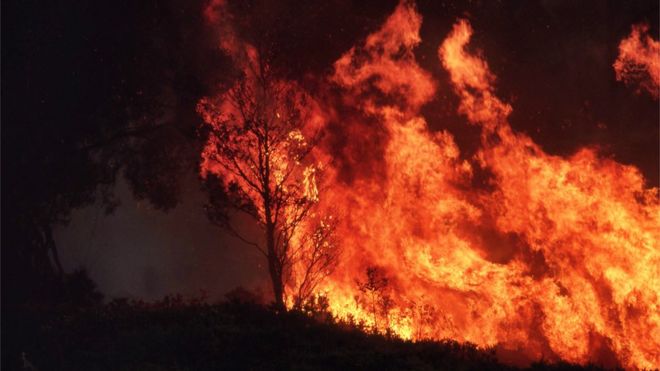Erica Alini of Global News reports on what Australia’s fires could mean for insurance and real estate in Canada.
 |
| Source: https://ichef.bbci.co.uk/news/660/cpsprodpb/6693/production/_110495262_gettyimages-1151121024.jpg |
Climate risk analyst Karl Mallon, in a recent report from his firm, Climate Risk, projects that 720,000 homes, or five per cent of Australia’s housing stock, will be uninsurable by 2100 as coverage becomes unavailable or prohibitively expensive.
Canada is not immune.
“The warmer it is the longer the fire season,” University of Alberta wildland fire professor Mike Flannigan told the Canadian Press. “The warmer it is the more lightning you see.”
For every degree of warming, the number of lightning strikes goes up by about 12 per cent, he said. Lightning usually causes more than half of the wildfires in Canada.
“We’re going to see a lot more. Not every year, but on average we’re going to see a lot more fire, a lot more smoke,” Flannigan said.1
Bill McKibben, author of “Falter: Has the Human Game Begun to Play Itself Out?,” comments that as the world’s leading coal exporter, Australia is burning down its own house. Now Australia is suffering, harshly, the early effects of climate change. It turns out that its unique physical features are remarkably susceptible to the global warming that’s now in its early stages. The Great Barrier Reef has been damaged by several bouts of severe bleaching from hot ocean water. The enormous kelp forests that ringed Australia’s southern coasts have been all but wiped out. And now fire has come in a way it never has before.
In other words, if Australia really were a planet it would be quickly, all by itself, destroying its climate. It can’t blame the destruction on others; in any moral calculation, Australia has done this to itself. Which is not to say individual Australians themselves are to blame. As elsewhere, the fossil fuel industry has done all it can to manipulate political systems: The election that brought Morrison to power saw one coal baron spend more money on campaign ads than the country’s major political parties combined. (The same coal baron, Clive Palmer, is also building a full-size working replica of the Titanic, if you like metaphor overload). And of course, the Australian political discussion is poisoned by its native son Rupert Murdoch, who owns most of the country’s newspapers and uses them to—well, you’ve seen Fox News.2
In a statement regarding Australian bushfires, the Australian Academy of Science is resolute that the response to the bushfires must extend beyond the immediate and essential need to rebuild and recover. Everything, including urban planning; building standards; habitat restoration; biodiversity and species preservation; and land, water and wildlife management will need careful and measured consideration.
We must further improve our ability to forecast changing environmental threats and continually improve climate modelling predictions. We must improve our understanding of fire behaviour and other adverse weather events, and we must continually develop new technologies, practices and behaviours to assist our nation to respond and adapt to, manage, and mitigate against such extreme events.
All the while, Australia must take stronger action as its part of the worldwide commitment to limit global warming to 1.5° C above the long-term average to reduce the worst impacts of climate change.3
Australia unfortunately may be literally blazing the trail in the response of insurance companies, mortgage lenders, to the over production of GHG from burning coal on the planet.
References
No comments:
Post a Comment